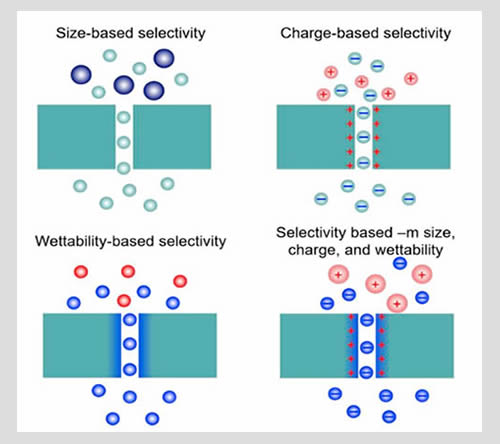Research: Thrust 3
Engineering Ionic and Molecular Selectivity in Chemical Separations
Selectivity is a key to chemical separations of complex mixtures. The goal of this Thrust is to uncover the mechanisms of ionic and molecular selectivity that stem from extreme confinement.
Understanding selectivity mechanisms in model systems will help to elucidate mechanisms not yet explored and to develop the design rules for rational fabrication of single-species selective membranes. The emphasis of this Thrust will be on both ionic and molecular selectivity. Ionic selectivity is important for applications such as water purification, seawater and brackish water desalination, and ultrapure water production, while molecular selectivity is critical to pharmaceutical and refining applications. Understanding selectivity mechanisms may also help develop materials strategies for separating Li+ ions from Na+ and K+ ions in seawater, and for making an exclusively proton-conducting membrane for fuel cells. The fundamental knowledge gap we wish to fill in is the critical role of each mechanism individually, and the optimal way to bring these together for separations. Knowledge from these investigations will provide the scientific basis for developing next generation membrane materials for the selective removal of pharmaceuticals, antibiotics, and endocrine disrupting chemicals in drinking water supplies, while still allowing the passage of essential minerals. Fundamental questions to be addressed include how geometry, chemistry, and solvation impact ionic transport selectivity, and how these findings translate into design rules for the rational design of ionic and molecular selective membranes.

